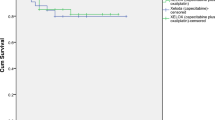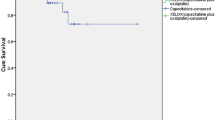Purpose:
The objective of this expanded phase II trial was to confirm the safety results of the preceding phase I study and establish the efficacy of neoadjuvant radiochemotherapy with capecitabine in rectal cancer in a multicenter setting.
Patients and Methods:
96 patients (63% male, age 34–81 years) with advanced rectal cancer (cT3–4 or cN+) from seven university centers in Germany were recruited. All were to receive a total irradiation dose of 50.4–55.8 Gy with conventional fractions. Capecitabine was given at an oral dosage of 825 mg/m2bid on each day of the radiotherapy period with the first daily dose applied 2 h before irradiation, followed by surgery 6 weeks later.
Results:
Most of the patients suffered from an advanced primary tumor (cT3: 57%, cT4: 40%) with lymph node involvement in 60%. After neoadjuvant treatment, with a mean of 99% of the scheduled radiation dose actually delivered, a clinical response rate of 68% (95% confidence interval: 57–78%) was observed. Out of 87 evaluable patients undergoing surgery, a sphincter-preserving procedure could be performed in 51% and R0 resection in 94%. A pathologically complete response was achieved in six patients (7%, 95% confidence interval: 3–14%). The comparison of initial diagnosis and pathologic findings showed a downstaging in 61%. Acute toxicity with > 5% incidence of NCI (National Cancer Institute) grade ≥ 3 included lymphopenia (12%), leukopenia (6%), and diarrhea (7%). Mild to moderate hand-foot syndrome occurred in 12% only. After a median follow-up of 48 months, the 5-year overall survival and tumor control data were, with regard to patient selection, in the expected range with an overall survival of 65%, a relapse-free survival of 47%, and a local recurrence rate after 5 years of 17%.
Conclusion:
The data clearly confirm that capecitabine is an adequate substitute for 5-fluorouracil in preoperative chemoradiation of rectal cancer with a favorable safety profile.
Ziel:
Diese multizentrische Phase-II-Studie sollte Effektivität und Toxizität einer neoadjuvanten Radiochemotherapie mit Capecitabine prüfen.
Patienten und Methodik:
96 Patienten (davon 63% männlich, Alter 34–81 Jahre) mit lokal fortgeschrittenem Rektumkarzinom (cT3–4 oder cN+) aus sieben deutschen Universitätskliniken wurden rekrutiert. Alle erhielten eine präoperative Radiotherapie (50,4–55,8 Gy in konventioneller Fraktionierung mit 5 × 1,8 Gy) und zusätzlich 2 × täglich 825 mg/m2Capecitabin während gesamten Radiotherapie (erste Dosis 2 h vor Radiotherapie, keine Pause am Wochenende). 6 Wochen nach der Radiochemotherapie war die Resektion geplant.
Ergebnisse:
97% der Patienten hatten T3/T4-Tumoren (T3: 57%; T4: 40%). Lymphknotenbefall (cN+) lag in 60% vor. Die präoperative Therapie war gut durchführbar (mittlere Strahlendosis 99%, mittlere Capecitabindosis 96% der geplanten Dosis). Die klinische Ansprechrate betrug 68% (95%-Konfidenzintervall: 57–78%) und entsprach der Studienhypothese. Von 87 auswertbaren operierten Patienten wurden 94% R0-reseziert; ein Sphinktererhalt war in 51% möglich. Sechs Patienten (7%, 95%-Konfidenzintervall: 3–14%) hatten eine histologisch komplette Remission (ypT0) im Resektat. Ein Downstaging wurde in 61% erreicht. Akute Nebenwirkungen CTC-Grad ≥ 3 (Common Toxicity Criteria) mit einer Frequenz von > 5% wurden für Lymphopenie (12%), Diarrhö (7%) und Leukopenie (6%) beobachtet. Ein Hand-Fuß-Syndrom trat in 12% auf und war jeweils nur mild (Grad 1–2). Die 5-Jahres-Überlebensrate betrug 65%, das rezidivfreie Überleben 47% und die lokale Kontrolle nach 5 Jahren 83%.
Schlussfolgerung:
Die Daten dieser multizentrischen Phase-II-Studie bestätigen, dass die Kombination von präoperativer Radiotherapie und Capecitabin eine wirksame und nebenwirkungsarme Behandlung beim lokal fortgeschrittenen Rektumkarzinom darstellt. Capecitabin eignet sich als Ersatz für eine kontinuierliche 5-Fluorouracil-Infusion.
Similar content being viewed by others
Author information
Authors and Affiliations
Corresponding author
Additional information
* Presented in part at the 40th Annual Meeting of the American Society of Clinical Oncology, New Orleans, LA, USA, June 5–8, 2004.
Rights and permissions
About this article
Cite this article
Dunst, J., Debus, J., Rudat, V. et al. Neoadjuvant Capecitabine Combined with Standard Radiotherapy in Patients with Locally Advanced Rectal Cancer. Strahlenther Onkol 184, 450–456 (2008). https://doi.org/10.1007/s00066-008-1751-4
Received:
Accepted:
Published:
Issue Date:
DOI: https://doi.org/10.1007/s00066-008-1751-4




